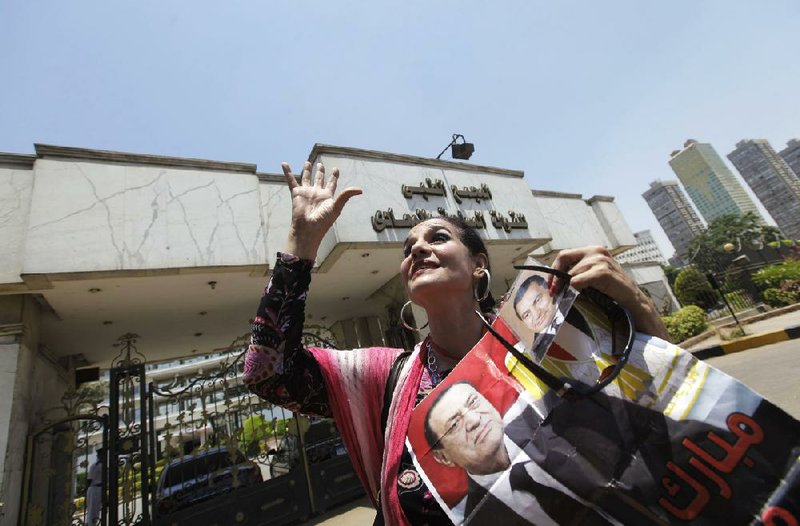CAIRO, Egypt — Confusion about an overnight report that former Egyptian President Hosni Mubarak was near death persisted Wednesday, as one of his lawyers disputed the account and said Mubarak had been moved to a hospital because of a head wound caused by a fall in a prison bathroom.
Meanwhile, Egypt’s election commission Wednesday delayed its final determination of who had won the presidential runoff one day before the scheduled announcement.
The commission did not say when it would announce the winner of the runoff.
But its secretary-general, Hatem Begato, told the state newspaper Al-Ahram that the winner would be announced Saturday or Sunday.
Youssri Abdel Razeq, the Mubarak attorney, said in an interview Wednesday that Mubarak, 84, who ruled Egypt for three decades, was in stable condition. He denied that Mubarak had suffered a stroke or been declared “clinically dead,” as was reported late Tuesday by state media. Abdel Razeq lambasted the media for spreading what he said were false accounts.
Word that Mubarak’s health had dramatically worsened began circulating as tens of thousands of demonstrators turned out across Egypt late Tuesday to protest recent moves by the country’s ruling generals. The reports injected new uncertainty into a tumultuous political moment, and the developments Wednesday fueled speculation that the health scare had been drummed up by the country’s military leadership.
Abdel Razeq said Mubarak, who until late Tuesday was being treated by doctors in the prison where he was serving a life sentence for failing to prevent the killings of protesters last year, needed to be transferred to the military hospital. He said it was necessary because of a steady deterioration in Mubarak’s long-poor health, and because he needed an MRI to check his worsening head wound.
“Torah prison hospital is not a real hospital,” Abdel Razeq said, adding that Mubarak has regularly lost consciousness for the past year.
Egypt’s state news agency reported that Mubarak, who ruled Egypt for three decades, had suffered a stroke and was declared “clinically dead” late Tuesday. But that report was quickly denied by a medical official at the hospital and by Abdel Razeq.
The former president was “conscious and breathing well,” the medical official said early Wednesday. Mubarak arrived at the hospital in cardiac arrest, the official said, and doctors got his heart beating again using a defibrillator. By midnight, he was resting in a suite, said the official, who spoke on condition of anonymity because he was not authorized to talk to reporters.
“He’s not dead,” Abdel Razeq said in a telephone interview from the hospital early Wednesday, contradicting reports of Mubarak’s demise. “Not clinically or otherwise.”
The lawyer said Mubarak’s fall in the prison bathroom had resulted in a blood clot on his neck.
Security outside the hospital where Mubarak was said to be staying was light for a facility housing the former head of state. Civilians came and went freely through a side door of the hospital Wednesday, and two people leaving the grounds said they noticed no change in the hospital’s operations or security.
Mubarak’s heath was long treated as a state secret while he was in power. Since his ouster, reports about his declining health have been met with skepticism by many Egyptians, who view such news as ploys to gain sympathy and leniency.
Mubarak was sentenced to life in prison June 2 for his role in the death of protesters during last year’s popular revolt, and the Middle East News Agency has said that his health took a turn for the worse after he was remanded to Torah prison to serve his sentence.
As rumors of Mubarak’s death spread Tuesday night, fireworks crackled across the capital, and a crowd that had gathered earlier in Tahrir Square, the center of the revolt that ousted Mubarak in February 2011, remained large and energetic.
The protesters, heeding a call from the Muslim Brotherhood and other groups, were making a show of force against the generals, whose recent moves have sparked fears of a return to authoritarian rule. The rallies represented an effort to demonstrate that the loose revolutionary coalition that toppled Mubarak has not run out of steam, even as the military chiefs appear to be broadening their authority and emasculating the presidency.
The delay in announcing the election result set up a potential new source of confrontation between Egypt’s military rulers and the Muslim Brotherhood, the once-outlawed Islamic political organization whose candidate, Mohammed Morsi, claimed to have won the presidential vote, Egypt’s first competitive presidential election, with 52 percent last weekend. His rival, Ahmed Shafiq, Mubarak’s last prime minister, also claims he won, with 51.5 percent.
The votes were counted publicly at the polling stations, and Egyptian state news media reported the same count as the Brotherhood. But on Tuesday, Shafiq disputed several of the tallies, including those reported in the state news media, that forecast Morsi as the winner.
Last week, the generals dissolved the parliament, which was dominated by the Brotherhood, saying the move was justified because of a decision by a court of judges appointed by Mubarak. The generals also proceeded to issue their own interim constitution, entrenching their power while all but eviscerating the authority of the new president.
The interim constitution also provided the generals and the Mubarak-appointed judiciary with broad sway over the drafting of Egypt’s next permanent constitution.
Information for this article was contributed by Ernesto Londono of The Washington Post; by Maggie Michael and Matthew Lee of The Associated Press and by Kareem Fahim, David D. Kirkpatrick, Mayy El Sheikh, Dina Salah Amer and Liam Stack of The New York Times.
Front Section, Pages 1 on 06/21/2012

